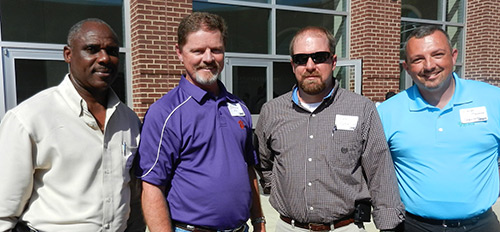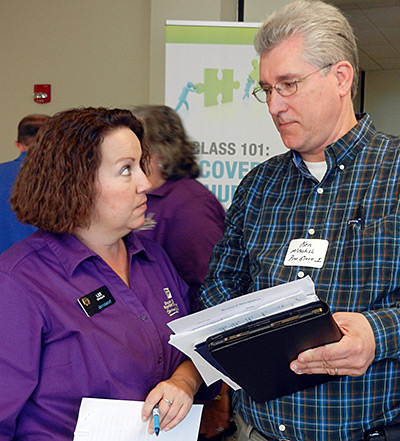Who knew there were so many connections between wrestling and discipleship?
 Discussion over lunch between Phillip Woods, of Next Level Ministries, Columbia; Donnie Nix, of Westminster Baptist Church; and John Baughn and Claude Massey of Grace Baptist Church, Laurens.
Discussion over lunch between Phillip Woods, of Next Level Ministries, Columbia; Donnie Nix, of Westminster Baptist Church; and John Baughn and Claude Massey of Grace Baptist Church, Laurens.At least 900 church staff and volunteers from all over South Carolina now know several, thanks to the Oct. 25 IMPACT conference at Riverland Hills Baptist Church, Irmo.
For starters, competitive wrestlers – like 80 percent of learners – learn the most from demonstration and practice, not from lecture.
“We have the wrong methods [for making disciples],” asserted Jim Putnam, founder of Real Life Ministries, Idaho, keynote speaker and former wrestling champion and coach.
“Discipleship is more than ‘me’ talking to ‘you,’ ” he said. “It takes modeling, accountability, encouragement. We use lectures, [but] Jesus’ methodology was relationship.”
Secondly, a wrestling coach, like any good coach, puts his students out on the mat (or field) to practice and then compete. He doesn’t practice for them, much less compete for them.
“Ephesians 4:11 says we’re called to equip for ministry, not to do all the ministry our-selves,” said Putnam, author of “Church is a Team Sport” and “Real-Life Discipleship.” “I can’t teach my students the ‘single-leg’ technique but not give them a chance to do it.”
Furthermore, he added, “Don’t get mad when your people critique you when that’s the only job you gave them to do.”
Julie Madden, church administrator at Crossroads Baptist Church, Spartanburg, understood that point. Noting her brother was a wrestler, she said, “Jim really articulated what I’ve been thinking for some time: We instruct and leave it there. We let people critique, and we don’t teach them to do.”
Third, in wrestling, as in any sport, everyone on the team must play out of the same playbook.
 Lee Douglas of the convention staff provides breakout session directions to Ken McCaskill, pastor of Pine Grove Church No. 1, Walterboro.
Lee Douglas of the convention staff provides breakout session directions to Ken McCaskill, pastor of Pine Grove Church No. 1, Walterboro.“We have to operate out of the same playbook so we all understand what definitions we’re using. If the quarterback says, ‘X-22-7,’ and everybody has their own idea what that means, you’ll go nowhere,” Putnam said. “We’ve defined ‘disciple’ in the wrong way. We’ve defined it as ‘one who has the right information.’ So we offer classes and think it’s all about knowledge. But Matthew 4:19 says we follow Jesus and He makes us something else.”
Ligon Hutto, lay leader from First Baptist Church, Bamberg, reflected on just that issue: “The Lord has been working in my heart on this. Am I really a Christian? That is, am I really a disciple? And if so, I have to be making disciples.”
Many conference-goers resonated with Putnam’s teachings and the training, whether they had prior exposure to the Real Life Ministries approach or not.
Said Ken McCaskill, long-time pastor of Pine Grove Baptist Church No. 1 in Walterboro, “This is helping me re-focus and refresh. It’s just what I needed to hear.”
Karen Schultz, member of Redd’s Branch Baptist Church, Aiken, and counselor with Child Evangelism Fellowship, said, “I have learned how I’m already discipling people in my life through the Good News Club and with my neighbors. I didn’t know that’s what I was doing! So this is really encouraging.”
Lisa Lancaster, whose husband Rich is pastor of Crossroads, Spartanburg, said they were also encouraged by the conference. “Rich has had this kind of model in his heart for years, wanting to make disciples, not just do programs. It’s so wonderful to hear an approach that’s been on our hearts for so long.”
The Real Life Ministries approach to discipleship focuses on intentional leaders, a relational environment, and an intentional discipleship process, all on a biblical foundation. It centers on small groups. Outside of these core elements, there are few requirements.
Kenny McDowell, minister of education at Buck Creek Baptist Church, Chesnee, has been leading his church in the Real Life approach for almost three years. He says people are always asking for the program or the curriculum.
“There isn’t any!” he said. “This approach takes the Word of God and relationships and marries them. It’s been the best thing we’ve ever done, and I’ve been a minister of education for 20 years. I always thought there was a missing link: How do we help people not just learn in a program but really grow and reproduce? This is it; it revolutionizes discipleship.”
Wayne Terry, director of the evangelism and multiplication team at the SCBC, said that request for help is precisely why the convention has partnered with Real Life Ministries for this event and others.
“One of the things we hear pastors confessing all the time is, ‘People are coming, but we’re not making disciples who make disciples,’ and of course that’s the biblical mandate,” he said. “That’s what the folks at Real Life Ministries are doing well, and it is why we brought them. I would estimate about 125-150 churches in South Carolina have been equipped at some level at multiplying disciples like that.”
Breakout sessions explored the transition into this discipleship approach for an existing church; the type of leadership required; the nuts and bolts of the Real Life Ministries process; and how to use the process in ministry and missionary settings.
“We are handed a box, full of definitions and methods for discipleship,” Putnam said, “and our job is to have the courage to compare the box to the Word of God and adjust accordingly, like Josiah.” – SCBC